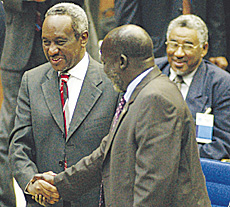NAIROBI, 20 November 2004 — Sudan’s government and southern rebels committed themselves yesterday to ending Africa’s longest civil war by Dec. 31, signing a pledge in front of 15 UN Security Council ambassadors at an extraordinary meeting.
After the signing ceremony, the Security Council, meeting away from its New York home for the first time in 14 years, unanimously adopted a resolution promising political and substantial economic support once Sudan ended two wars that have left millions dead in the south and in Darfur in the west.
With the council’s ambassadors as witnesses, the Sudanese government and the Sudan People’s Liberation Movement (SPLM) signed a document declaring “their commitment” to complete a final accord by Dec. 31 and end 21 years of war in the oil-producing south of Africa’s biggest country.
Sudanese Vice President Ali Osman Taha and southern rebel leader John Garang, the main peace negotiators for the two sides, have made similar, failed pledges over the past year.
But this time they did it on paper before the Security Council, whose members tried to dispel skepticism over the deal and criticism of the UN’s handling of the Darfur crisis.
US Ambassador John Danforth, the current council president, acknowledged some believed the council had come to Kenya to deliver “grand words” while people were dying.
“It’s up to you to prove the naysayers and skeptics wrong,” he told Taha and Garang at the meeting. “The violence and atrocities being perpetrated must end now. You have heard this message clearly from the Security Council — heed it.” But human rights and humanitarian groups were not convinced, with Amnesty International calling for a mandatory arms embargo on all parties.
“From New York to Nairobi, a trail of weak resolutions on Darfur has led nowhere,” said Caroline Nursey, regional director of the Oxfam charity.
Jerema Rome of Human Rights Watch feared Sudan “will take this resolution as a blank check to continue its persecution of the civilian population in Darfur”.
The council’s resolution said it would consider “appropriate” actions if Sudan did not follow through on its commitments, an oblique threat of sanctions but weaker wording than in previous resolutions. China, which exploits oil and sells arms in Sudan, has said it would veto any penalties and Russia is also opposed.
Sudan faces conflict on many fronts — mainly in the south where rebels have been fighting the government since 1983, when Khartoum tried to impose Islamic law on the entire country. But violence has also erupted in Darfur, triggering what the United Nations calls the world’s worst humanitarian crisis.
Council ambassadors believe the north-south pact, if implemented, could be a blueprint for Darfur, where civilians are being killed, raped and driven out of their homes by Arab militia.
Khartoum has already signed six preliminary protocols with the southern rebels that would form a coalition government, decentralize power, share oil revenues and integrate the military. The south in six years can vote for succession.
Britain’s UN ambassador, Emyr Jones Parry, said such a plan could extend powersharing to those in Darfur and elsewhere who felt they were marginalized by Khartoum.
Danforth initiated the trip to Africa, arguing direct talks with northern and southern leaders would send a message that the world was watching and that peace would earn development aid. The resolution asks the United Nations, the World Bank and others to devise a reconstruction plan, including possible debt relief, for Sudan once the country is at peace.


